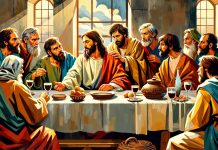“[Jesus] told them another parable: ‘The kingdom of heaven is like a mustard seed, which a man took and planted in his field. Though it is the smallest of all seeds, yet when it grows, it is the largest of garden plants and becomes a tree, so that the birds come and perch in its branches.’ He told them still another parable: ‘The kingdom of heaven is like yeast that a woman took and mixed into about sixty pounds of flour until it worked all through the dough.'” Matthew 13:31-33
These two stories seem, at first glance, devoid of any intrigue. However, there is surprising hyperbole hidden in each of them. It is not enough that the mustard seed is, proverbially, the smallest seed in the herbarium of a traditional Palestinian household (though not the smallest in size), nor that there is an enormous disproportion between the seed and the plant that grows from it.
In His parable, Jesus magnifies the plant, turning it into a tree, the kind of tree that dominates the landscape, so much so that “the birds come and perch in its branches.” This image evokes both the chosen people, as well as the mythical tree of Nebuchadnezzar’s dream, which “was visible to the ends of the earth… on it was food for all. Under it the wild animals found shelter, and the birds lived in its branches; from it every creature was fed.” (Daniel 4:11-12).
The second story hides, under the guise of the banal, the same deliberate disproportion. The dough, as was the practice at the time, was a very small amount of the total mass that needed kneading, which was put (other translations mention, more revealingly, it being hidden) in the flour. But here Jesus indicates a completely unusual amount of flour (the three measures, volume units, would be equivalent to about 35 litres), “was all that a woman could knead, and the resulting bread would feed about a hundred people.”[1]
Jesus spoke of His Kingdom as being the purpose for which He came among humans, and prophesied, with delight and excitement, of an unimaginable development, a universal blessing, and a radical transformation of mankind.
A modest existence with a global impact
The author of the following text is unknown. These few lines capture the contrast between the apparent banality of Jesus Christ’s life and the unprecedented transformation of humanity that He generated: “He was born in an unknown village, the child of a country girl. He worked in a carpentry workshop until He turned thirty, and for another three years He was a traveling teacher. When the tide of public opinion turned against Him, His friends turned their backs on Him.
“He was handed over to His enemies. He was tried and convicted. He was nailed to a cross between two robbers. When He died, He was buried in a loan grave. He didn’t write any books. He did not hold any public office. He never had a house of His own. He didn’t go to college. In His traveling He did not wander further than three hundred miles from the place where He was born.
“He never did any of those things that go hand in hand with grandeur. However, all the armies that ever marched, all the governments that ever existed, and all the kings that ever ruled did not change life on this earth as powerfully as the life of this one man.”[2]
Apparent fragility, incomparable resistance
When the life of Jesus—or rather, the seed from which Christianity grew—was planted, the thought patterns of the Greek world and the political structures of imperial Rome seemed eternal. And yet, despite the flaws of the Christian church, the internal struggles, and the corruption, Jesus’s dream of transforming human society has come true in an amazing way. In many ancient cultures, the elderly and the suffering were not been treated with respect and compassion.
Those beyond the borders of their own nation were regarded, even by the Jews, as enemies who were to be destroyed, not helped to lead a better life. Ordinary people were not considered good enough to deserve an education. But the Master of Nazareth turned the mercy towards those in distress into the hallmark of His life and the mission entrusted to His disciples. In addition, He surrounded himself with simple people, mostly fishermen and peasants from despised Galilee, whose minds He opened to the deepest and most complex truths.
Then He gave them the huge and revolutionary task of going all over the world and teaching, everywhere, all they had received from Him. Missionaries of all ages not only carried with them the name of Jesus, but shared with their new converts the alphabet and the school, the dispensary, and the progress.
“His statement was paradoxical (Matthew 5:13), but what is far more paradoxical is the fact. Nearly all of the rest of the things on which men depended did actually decay. The Roman Empire did come to an end; Plato’s Academy finally closed; the great library at Alexandria was finally burned; the legions were scattered; the schools of the Stoics and the Epicureans faded out.
“But the little redemptive society which Christ instituted as the divine preservative went on. It entrenched itself in the Greco-Roman world; it penetrated Caesar’s household; it carried men through the Dark Ages; it survived the Renaissance, the Reformation, the Enlightenment and the Industrial Revolution, as it is now surviving the Atomic Revolution…The incredible has occurred.”[3]
The power of a mustard seed
Nowadays, the power of faith sometimes appears under the guise of weakness and defeat. Its impact on people may become apparent later, as illustrated by an article published in a widely circulated Romanian newspaper, in early 2007, at a time when the relationship between the majority church and the secular school was being fervently debated.
“A quarter of a century ago, when I was a seventh grade student at a primary school in the Berceni neighborhood, I had a colleague named Beatrice. She was a small, beautiful, smart girl. She was sitting at the second desk, on the middle row. She was a good student and did not speak when not asked to. She was dressed according to the rule and was a dream child compared to the rest of us, who were noisy, bad, and messy.
“To the rest of the class, Beatrice was a mystery. I sincerely envied her. At the time, it seemed incredible to me that a student would miss a day of school every week. Besides not coming on Saturday, Beatrice was also absent during the last classes on Friday. I was studying in the afternoon and, as evening fell, she gathered her bags and left. She was like Cinderella, in a hurry to leave the ball before midnight.
“Beatrice was the daughter of doctors, and her family was a member of the Seventh-day Adventist Church. Every Saturday, teachers would mark her absence as groundless. The headmistress and the school principal talked to her parents, threatened them, and she was criticized during every ‘detachment meeting’. She was scolded, and despised for her faith.
“On a Friday afternoon, as the end of history class was approaching, our teacher, five minutes before the bell rang, suggested that she would not let Beatrice go. ‘I think you have to stop with this special program. I’m going to ask your classmates to prevent you from leaving the class. And I will stay here until the next teacher comes’.
“Beatrice, impassive to threats, began to gather her things. The teacher shouted at us to stop her. A few boys, including myself, locked the door, while others surrounded her, trying to persuade her to give up.
“Beatrice sat down. She covered her ears with her hands so that she would no longer hear us and began to cry. Tears streamed down her cheeks like two springs that had finally found their way to the light. We froze. Silence fell as though the whole class had a simultaneous revelation. We were ashamed. Despite the teacher’s protests, we returned contritely to our desks. Beatrice went out with tears streaming down her cheeks […].
“From that day on, Beatrice had no problem leaving school. A kind of mysterious solidarity had emerged between us and her. We helped her. I prevented the teachers from seeing her when she was leaving. I would share with her what was taught on Saturday and I would whisper the answers to her when she was summoned in front of the class, even if she didn’t need them”.[4]
“A kind of mysterious solidarity”—a subtle and irresistible confirmation of the words of the Teacher of Galilee: “…until it worked all through the dough”.
Is this transformation (however spectacular and surprising) complete? Certainly not. God’s Kingdom on earth is not a full reflection of God’s Kingdom in the afterlife. Jesus’s prayer that God’s will be done “on earth as it is in heaven” is still an unfulfilled ideal. The painful tension between what is and what could be remains.
The vision of transforming humanity through the power of love and the gospel reaches its goal only with the eschatological vision, when evil will be eradicated, in a new world, populated by those who have accepted, and who live out, the principles of a new life. Christian hope relies not only on the progress of human society, but on God’s decisive intervention, on the resurrection of the dead, and on everlasting life.




















